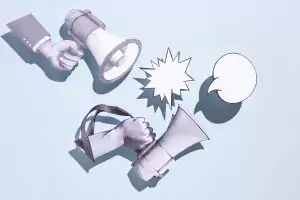
 AI Essay Writer
AI Essay Writer  AI Detector
AI Detector  Plagchecker
Plagchecker  Paraphraser
Paraphraser Summarizer
Summarizer  Citation Generator
Citation Generator
Hi everyone!
When I was a younger and less experienced writer, I often thought how great it would be if books could, on their own, engage readers. For example, an old lady standing in a bookstore would see my book and immediately think, “Oh, this one looks interesting—I should read it.”
Unfortunately, this does not happen in real life often, and to make people want to read your book, you must work hard. Composing engaging titles is one of the most effective ways to do this; journalists and bloggers know it the best. This is why they often compose screaming or intriguing headlines. The good news is that there is nothing hard in composing headlines and titles. Just follow the guidelines below, practice, and you will be fine.
- If you are writing a headline for a blog post, try adding numbers to it. Perhaps, while browsing the Web, you noticed how attractive titles like, “Five easy ways to lose weight,” “Ten reasons why you don’t feel motivated,” can be. Numbers promise specifics. Even numbers are okay, but sometimes it is better to use odd numbers, like 13 or 23—it is unusual, and odd things evoke curiosity.
- Use strong adjectives and verbs. This has been a technique used by journalists as long as media has existed. The same headline (or title) can sound different depending on your word choice. Compare the following two titles:
– Woman loses extra weight in a week.
– Woman drops her fat in only seven days.The second title uses strong vocabulary (“drops” instead of “loses”) and numbers (“seven days” instead of a “week”).
- The more controversial and debatable your title sounds, the better. Try creating a title like, “10 Reasons Why You Should Not Quit Smoking” for a blog about health, and you will get hundreds of unique views every day—just be prepared for tons of critique.
- If you are writing a book or a novel, let your title tell a short story, or provide readers with a hint about what the book is going to be about. This is my opinion, but such titles work best; the most prominent example of such an approach is the title Dr. Strangelove, Or: How I Learned to Stop Worrying and Love the Bomb.
- Another way to make a title more interesting is to make it enigmatic, or bizarre. This technique is widely used by musicians, who give strange names to their bands, like God is an Astronaut, My Panda Shall Fly, Florence and the Machine, Maybeshewill, and so on. Such names often make people want to listen to the band—at least to check out what music could such a weird band play. In literature, it’s the same, I think. Among the examples of such naming could be Murakami Haruki’s early novels (A Wild Sheep Chase), Ken Kesey (One Flew Over the Cuckoo’s Nest), Tom Wolfe (The Bonfire of the Vanities, Electric Kool Acid Test), or Jack Kerouac (Dharma Bums).
- Use the words what, how, why, and when. The questions readers want to ask about a book usually contain these words.
Try using words like desperate, free, amazing, horrifying, destroy, accuse, claim, terrorized, fun, guarantee, secret, principles, and so on. They are incredibly effective in headlines.
Follow us on Reddit for more insights and updates.

 published June 5, 2015 - updated September 20, 2017
published June 5, 2015 - updated September 20, 2017 


Comments (0)
Welcome to A*Help comments!
We’re all about debate and discussion at A*Help.
We value the diverse opinions of users, so you may find points of view that you don’t agree with. And that’s cool. However, there are certain things we’re not OK with: attempts to manipulate our data in any way, for example, or the posting of discriminative, offensive, hateful, or disparaging material.